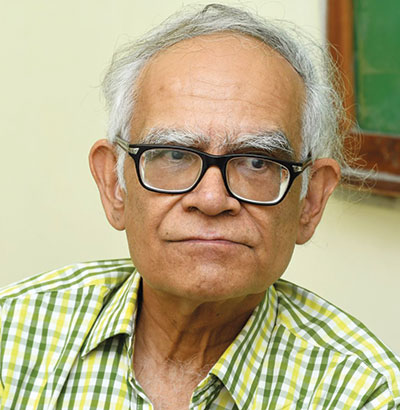No products in the cart.
Environment education for Google-savvy children
 Dr. Krishna Kumar is former director of NCERT and former professor of education at Delhi University
Dr. Krishna Kumar is former director of NCERT and former professor of education at Delhi University
Every now and then, we hear about the release of a doomsday report detailing the dire state of the environment. The latest is a UN report which warns that more than a million animal and plant species will be lost if urgent action is not taken to stop the all-round assault on nature. This report has been prepared by the UN’s Intergovernmental Science-Policy Platform on Biodiversity and Ecosystem Services (IPBES). If so many species are allowed to become extinct, the ongoing crisis of nature, including climate change, will exacerbate to an irreversible degree.
Many reports on this subject have surfaced over the years, and they have supplied the basis of global agreements on the urgent need to address the world’s ecological crisis. They are received with a considerable amount of cynicism. The dominant view that little can be done or will be done, is coupled with ignorance about what can be done.
Many believe what needs to be done is beyond the capacity of most governments. Among those who aren’t averse to doing something, tacit conflicts arise over who should do it first. This is because the pioneer will also suffer the heaviest cost of change, from improved technology to curtailed economic growth at least in the interim period. Finally, there’s a common negative perception about governments, their limited capacity and subservience to powerful corporate interests in petroleum, weaponry, plastic and so on.
Somehow, even those who hold the extreme cynical view –‘nothing or very little can be done’ — believe that education can do something. What they generally mean is simple: education can create greater public awareness. This is a simple wide-spectrum remedy that people in high positions love to dispense orally. Dispensation costs little. Education costs a lot, so the matter seldom goes beyond orally conveyed agreements and promises.
Education also evokes the feeling that the future holds potential for change. The burden of awareness feels lighter when it is placed on future generations. Transferring the burden to the next generation of presumably more enlightenened politicians is both convenient and convincing. Best of all, it involves no immediate commitment to education and its real financial demands today. These demands are seldom acknowledged, let alone estimated properly. Moreover, they are mostly interpreted in terms of infrastructure, computers and so on.
In India, an age-old perception continues to lurk in the public and political unconscious minds. The perception is that education can be delivered under a tree. The image of ancient sages tutoring a handful of boys clad in ritual attire accompanies this view of education. When people criticise the modern, salaried teacher, they often compare her to this ancient sage whose material demands for imparting knowledge and learning were minimal even if the learners were royal princes.
Therefore, our society does not appreciate the modern teacher. It pays ample lip service to the vital role teachers play, but no middle class parents want their progeny to join K-12 teaching as a career if they can help it. Nor does the state appreciate teaching. It regards the teacher as a lowly functionary. Teaching contemporary young children with confidence requires high-quality professional training on top of good general education. To explain the threat of climate change or imminent loss of biodiversity to Google-savvy children in a manner that will engage them calls for enormous investment in the preparation of teachers. No one seems willing to make that investment on the scale required. In fact, neither the State nor the private sector has made a realistic estimate of the massive expenditure necessary.
Then comes the question of how environment-related matters should be taught so that children’s learning goes beyond the usual preparation for an exam. A pedagogic process that doesn’t get stuck in the need to reproduce verbatim, calls for the creation of a classroom environment in which children are relaxed and fearless about posing questions that might hurt. Imagine children of a well-equipped, expensive contemporary school asking why the management chose to buy plastic chairs or how much electricity the school consumes to keep its building cool.
Such radical questioning is unlikely to be tolerated in the best of our schools, and few are likely to encourage it. Without such stimulus, we aren’t going to have a Greta Thunberg in our midst. She is the 13-year-old Swedish girl who has mobilised, not merely inspired, hundreds of thousands of European school children to demand decisive action from political leaders to save the ecology of our planet. Some political leaders have criticised her for inciting children. They want them to desist from demonstrating in public places. They want them to focus on their studies instead, and aim at becoming globally competitive to get good jobs. Sounds familiar.






 Dr. Krishna Kumar is former director of NCERT and former professor of education at Delhi University
Dr. Krishna Kumar is former director of NCERT and former professor of education at Delhi University








Add comment